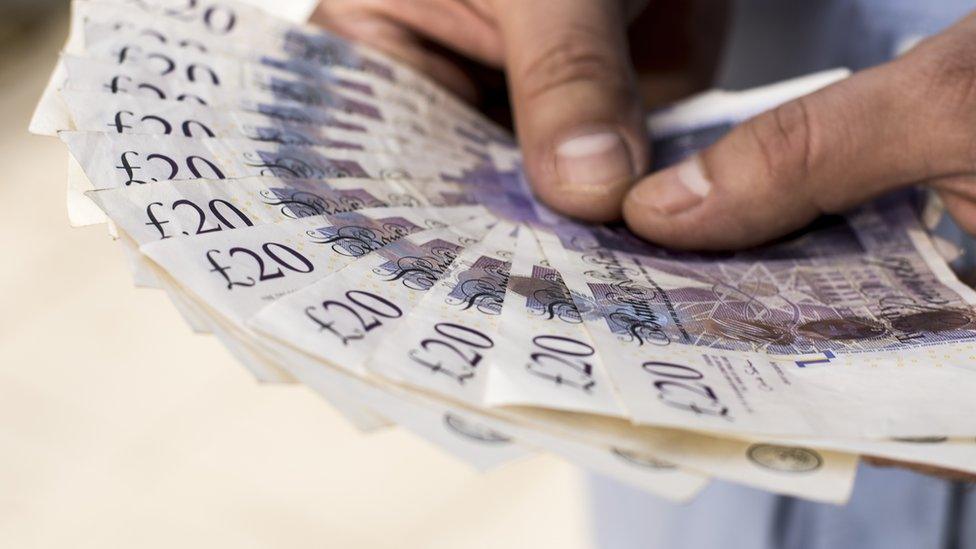FTSE bosses earn 86 times more than average worker in 2020
- Published

The bosses of Britain's biggest companies earned 86 times the average full-time wage last year.
The median pay of a chief executive of a FTSE-100 firm - the UK's blue chip company index - was £2.69m in 2020, according to the High Pay Centre.
That was down 17% from £3.25m in 2019, before the pandemic hit.
"These are still very generous rewards," said High Pay Centre director Luke Hildyard.
The think tank's research revealed average bonus size fell from £1.1m in 2019 to £828,000 last year.
Meanwhile the average long term incentive plan payment fell from £2.4m to £1.38m.
"CEO pay packages are designed to reflect the experience of shareholders, employees and other stakeholders so in one sense the lower pay levels this year show the system working as intended," Mr Hildyard said.
But he pointed out that most chief executives have already made millions of pounds over the course of their careers and the still high rewards come "at a time when, in general, government support for the economy has probably been more important to the survival and success of the UK's biggest companies than the decisions of their executives."
The research also showed that average chief executive earnings at the nine FTSE-100 companies that used the furlough scheme to pay their employees, was £2.39m.
Mr Hildyard said the UK's high chief executive pay reflected a wider gap between rich and poor in Britain than in most other European countries.
Top five FTSE earners
Pascal Soriot of drugs giant AstraZeneca was the highest-earning chief executive, making £15.45m last year.
He was considerably ahead of Brian Cassin of credit reference agency Experian who made £10.3m, according to the think tank's figures.
In third spot was Albert Manifold of building materials company CRH who received £9.92m.
Laxman Narasimhan of consumer goods firm Reckitt Benckiser was fourth with £9.24m, while the fifth highest-paid FTSE boss in 2020 was Rob Perrins of housebuilder Berkeley, who made £8.03m.
Valuable
Chief executive pay has fallen when their roles have never been more valuable, reckons Matthew Lesh, head of research at the Adam Smith Institute.
"Amid a historic global crisis the captains of industry have played a key role in keeping us fed, entertained and connected," he said.
Generous compensation is necessary to attract top talent that delivers innovative products, creates jobs and boosts company value, Mr Lesh added.
"Investors are known to react viciously to changing CEOs because leadership is key to business success."
He said that rather than obsessing about chief executive pay, "we should embrace policies that will boost pay for all workers as the economy recovers from Covid-19.
"This means cutting taxes and red tape that holds down incomes."


Debit where it's due
Quite apart from the reminder of the huge gap that has, over the years, opened up between the best-paid employees and the average - with chief executives on 86 times as much as the average worker - the High Pay Centre think tank's analysis is also a reminder of the weakness of the premise on which exorbitant bonuses and long-term incentive plans are based.
This is namely that the key determinant of a company's success is the shareholder value it generates. In addition, it is the notion that the key determinant of that is a talented top boss who must be attracted, retained and incentivised to do their best by the offer of big money.
It wasn't Pascal Soriot, the highest paid chief executive of a FTSE-listed company (pay: £15.45m), who led the team that came up with AstraZeneca's vaccine. That was Sarah Gilbert and Andrew Pollard of Oxford University. But the reason shareholders won't begrudge him it isn't because of what it did to AstraZeneca's profits.
In fact, by offering to distribute it at no profit (unlike Pfizer), AstraZeneca's losses due to the vaccine in the first half of 2021 were more than $50m.
But what it's done for the firm's reputation - and the benefit to public health - are incalculable. It's not just the bottom line that counts.
Related topics
- Published6 January 2021

- Published17 August 2021

- Published17 August 2021
